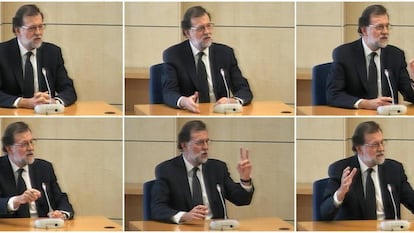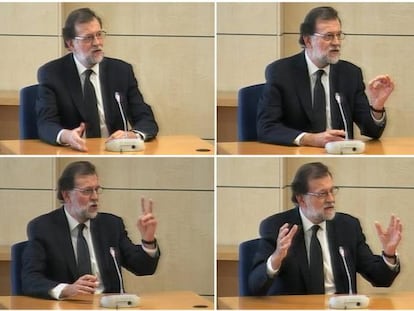Gürtel ruling questions “credibility” of Spanish PM Rajoy’s testimony
Judges find evidence of existence of a Popular Party slush fund, something that the party leader denied in court last year


Two of the three judges in charge of the trial covering the first period of the Gürtel case, the largest political corruption scandal in Spain’s democratic history, consider it a proven fact that the Popular Party (PP) kept secret accounts for years.
What’s more, they openly question the “credibility” of the testimony offered by Prime Minister Mariano Rajoy and other top party officials at hearings last year.
The PP operated “a financial and accounting structure that ran parallel to the official one, at least since 1989”
In a judgment that is nearly 1,700 pages long, Judges Julio de Diego and José Ricardo de Prada mentioned the PP’s opaque accounting system up to 12 times, and used it as the basis for their decision to sentence former party treasurer Luis Bárcenas to more than 33 years in prison.
The judges found “solid” evidence of the existence of the ledgers, and said that the testimony by Rajoy and his aides, all of whom denied knowledge about any illegal financing scheme, “does not seem plausible enough” to invalidate this evidence.
The judgment noted that several individuals who showed up in these secret accounts as recipients of money – the former deputies Jaime Ignacio del Burgo, Santiago Abascal and Luis Fraga – admitted at their own hearings that they had indeed received those amounts.
As a result, the testimony by Rajoy and other party officials “does not seem plausible enough to refute the solid existing evidence” about the party’s slush fund, wrote the judges.
The judgment mentioned the PP’s opaque accounting system up to 12 times
The ruling also notes that at least two senior officials, Javier Arenas and Pío García Escudero, indirectly confirmed the existence of this fund when they mentioned a dinner held in 2008 in honor of Bárcenas’s predecessor Álvaro Lapuerta.
According to the judgment, the PP operated “a financial and accounting structure that ran parallel to the official one, at least since 1989.” Records of incoming and outgoing funds “were kept informally, occasionally through handwritten notes,” by Bárcenas.
These other accounts reflected “party income and expenses, or in some cases amounts that were handed to relevant party members.” These revenues came “largely from inputs and contributions that violated existing regulations on political party financing” because they were made by “individuals and companies that later benefited from significant public contracts, as payment for the favorable treatment.”
Bárcenas dipped into this opaque fund for his own benefit, taking out large amounts that ended up in Swiss bank accounts or in real estate, the judgment finds.
The court has found 29 out of the 37 defendants in the main Gürtel trial guilty of a wide range of crimes, from taking bribes to document forgery, embezzlement, money laundering, influence peddling and more.
A separate trial is pending over the slush fund; because of the sheer scope of the Gürtel investigation, the case has been broken up into smaller parts. In February 2017, the Valencia High Court sentenced Correa aides Pablo Crespo and Álvaro Pérez to 13 years behind bars for unlawfully securing event organization contracts from the regional government of Valencia.
English version by Susana Urra.









































